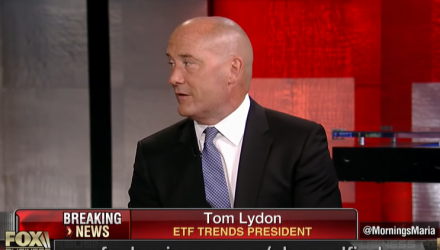The demand for ETFs domestically is beginning to wane, forcing investment firms to offer more innovative product solutions or slash their fees in the process, but international interest in ETFs is beginning to intensify and firms are ready to scramble in order to capture that market share.
“For the first time in five years, international flows in the ETFs have outpaced U.S. flows,” said ETF Trends President Tom Lydon during ‘Mornings With Maria’ on Fox Business Network on Monday.
Watch Lydon’s full Fox Business segment below:
Rise of Fixed-Income ETFs
One area that has been getting increased interest from investors is in the fixed-income arena. Inflows into fixed-income ETFs beat equity inflows in the second quarter, seizing control of a U.S. ETF industry with $3.6 trillion in assets.
Related: Active ETFs to Help Fixed-Income Investors Navigate Rising Rates
Investors have been keen to flock to areas of higher yields as of late with the Federal Reserve’s rate spikes thus far in 2018, leaving the doldrums of Treasury yields behind in the process.
“Rising rates have affected Treasuries as we know from a negative standpoint, but during these times, corporates and high-yields actually do well in times of rising interest rates,” said Lydon.
![]()

The move to higher yields by fixed-income investors also alludes to the notion that higher risk is in vogue and risk-off has fallen to the wayside. Yields on the benchmark 10-year Treasury may have hit the 3.1% mark in May–the first time since January 2014, but has since fallen 2.84%.
Furthermore, when you add in trade war risks to the mix affecting Treasuries, you have an environment that’s more conducive to higher-yielding debt.
“If you have a bond portfolio that’s mixed, the Treasury portion of your portfolio is probably challenged and the high-yield portion is probably doing well,” said Lydon.
Hedging Trade Wars with Small Caps
Another effective way to hedge the risk of trade war news affecting an investment portfolio is the inclusion of more small-cap exposure. The Russell 2000, the authoritative index of small-cap stocks, has been enjoying record highs, outperforming their large-cap peers.
